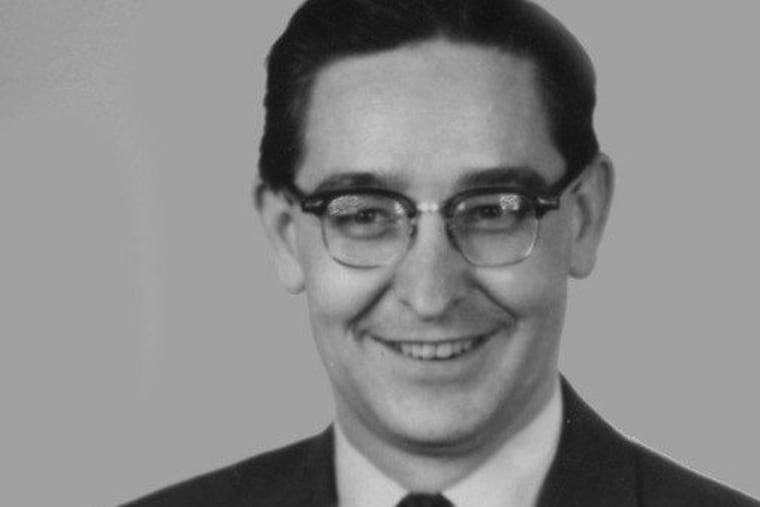Dr. Wesley D. Smith, 88, former classics professor at the University of Pennsylvania
Dr. Smith's expertise was in Greek and Roman literature, including poetry and plays. He was interested in the intellectual themes and how the original meaning of those themes evolved over time.

A memorial service will be Friday, Aug. 3, for Wesley D. Smith, 88, of Roxborough, a former classics professor at the University of Pennsylvania, who died Saturday, June 23, of respiratory failure at Cathedral Village in Philadelphia.
Dr. Smith began teaching in Princeton University's classics department in the fall of 1955. In 1961, he joined the department of classical studies at Penn, and he taught and wrote dozens of scholarly papers before retiring in 1996.
His area of expertise was Greek and Roman literature, including poetry and plays. He was most interested in the intellectual themes he uncovered and how the original meaning of those themes evolved over time.
"I have done considerable work to clarify the ideas of health and disease in ancient literature," he wrote in his CV. "I have worked on the history of theatrical production to clarify the staging of classical tragedy, and I have worked [on] ancient music."
Dr. Smith was most interested in Hippocrates, the ancient Greek who is viewed as the father of Western medicine. Hippocrates established ethical standards for the practice of medicine and devised the oath in which doctors pledge, among other things, to do no harm.
Dr. Smith's signature 1979 book, The Hippocratic Tradition, chronicled Hippocrates' life and writings as viewed through the eyes of other thinkers throughout history. The book was published by Cornell University Press and reproduced for online in 2002.
"It is difficult to isolate the facts of Hippocrates' life from the later tales told about him, or to assess his medicine accurately in the face of centuries of reverence for him as the ideal physician," Dr. Smith wrote in an online synopsis of the book. "About 60 medical writings have survived that bear his name, most of which were not written by him."
Joseph Farrell, Dr. Smith's friend and colleague in classics studies at Penn, said that "in an ideal sense, all academics are trying to establish the truth" in any field of inquiry.
What makes this tricky is that two parallel lines of thought can emerge. One is the truth as someone like Hippocrates wrote or spoke it. A second is the interpretation of scholars over time, which creates a different meaning.
"Sometimes these things gather two meanings over time," Farrell said. "That is one of the key problems we have as a researcher and an intellectual."
What Dr. Smith gave credence to was comparing the two lines of thought as a legitimate intellectual task, Farrell said. At first scholars resisted that comparison, but now it is accepted, Farrell said.
Born in the copper-mining town of Ely, Nev., Dr. Smith moved with his family to Seattle, where he attended the public schools. He earned a bachelor's degree in Greek and Latin from the University of Washington in 1951. He completed a master's degree in 1953 and a doctoral degree in 1955, both in the classics from Harvard University.
Dr. Smith lived in Powelton until 2006, when he moved to West Mount Airy. He had lived at Cathedral Village since 2012.
He was married twice, first to the film and Broadway stage actress Lois Smith, and second to Karen Faulkner. He had a daughter by Smith and a son by Faulkner. He was twice divorced, and both wives survive.
Dr. Smith was known for planning lively vacations.
"He always retained his love of the West and liked to travel there by car with his family every few years while his children were growing up," Faulkner said. They explored caves, hiked up mountains, and visited historic sites.
In one trip, he and his family followed the route author Laura Ingalls Wilder made famous in the Little House on the Prairie books. The Wilder family moved from the East to North Dakota in the 1870s, as the railroad expanded the frontier.
Dr. Smith sang with the Philadelphia Chorus. He played squash regularly. Shortly before retiring, he learned ceramics and painting at Community College of Philadelphia, and art became his passion, Faulkner said.
In addition to his former wives, he is survived by a daughter, Moon Elizabeth Smith; a son, Anthony Smith; five grandchildren; and Faulkner's son, Josh Olson.
A memorial service will be at 3 p.m. Friday, Aug. 3, at Cathedral Village, 600 E. Cathedral Rd., Philadelphia. Burial is private.
Donations may be made to the Refugee and Immigrant Center for Education and Legal Services via https://www.raicestexas.org/donate/.